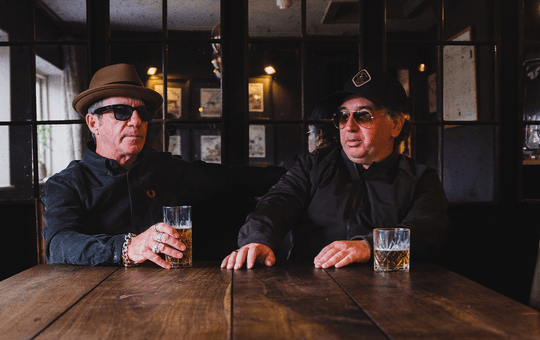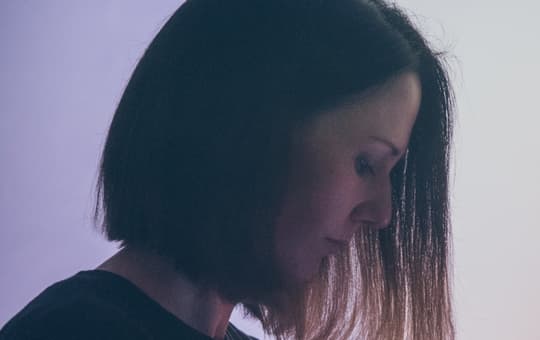
Peggy Gou: "I would like to be the first Korean female DJ that plays in Berghain."
South Korean producer Peggy Gou had her first experience of composing music at the age of eight years old. In her home city of Seoul, she was learning how to play piano – which, many years later, has now led her to pursue producing and DJing as a serious career. She ended up moving to London in her teenage years, where she was working as well as learning English and studying fashion – including a job at a club in the centre of the city. She tells me exasperatedly over the phone, “I had the worst experience, there’d be girls and guys who would come up to me and say can you play Justin Bieber or Rihanna?”
Five years ago, she started to pick up how to make tracks for the dancefloor, getting lessons in Ableton from Esa of Huntleys & Palmers’ sister label, Highlife. Deciding that she wanted to focus on music more full-time, she gave up her position as fashion editor at Harper’s Bazaar and moved to Berlin. “When I moved to Berlin, I told myself, I’m only going to do music and I will never work in fashion. I want to look serious,” Gou explains. However, with a nudge from producer friends, she was convinced to do both at the same time.

Fast forward to 2016, and Peggy now has two EPs under her belt, the latter being a two-tracker released through Phonica White. It’s a beautiful exploration of the soft and harder sides of Gou’s production – with the first track delving into house with a reverb-drenched piano sample and the second exploring sticky acid sounds, featuring her own voice counting in Korean. Gou used to be a regular customer at the Soho-based record shop and knew founder Simon Rigg beforehand, who asked her to put out something on their label.
Speaking to Gou over the phone one afternoon before she headed off record digging around Berlin with her friend, we discussed various topics spanning from South Korean nightlife all the way through to techno purism.
You’re going record digging with your friend later, is that the primary way that you tend to go looking for records or do you also go looking for them online?
Peggy Gou: “I do both, I would say 50/50 because with online stuff it’s easier to find music but with record shopping it’s a bit difficult, because there’s more effort and sometimes you find something you don’t expect.”
Where do you tend to go record digging in Berlin?
Peggy Gou: “I go to OYE-Records often and Hard Wax. Today I was thinking about going to Space Hall, I haven’t been there for a while. I really like that shop but it’s too smoky.”
So I wanted to ask – how long you were making demos before you felt you were happy with tracks to release for your first record?
Peggy Gou: “I guess four or five years. I was learning production from a guy called Esa [from Highlife] who’s also a producer who does a lot of African music. I was getting a one on one lesson from him when I lived in London. He taught me how to use Ableton, every time I’d make something different – I was like “Esa! This is something I made last night, hear it.” That was more than four years ago I would say. I was into a lot of Asian sounds in the beginning. If you listen to my early demos they all sound similar. Then I wanted to be more serious and realised that this was what I wanted to do, so I thought why not try to live in Berlin? So I moved here and worked in a record shop too.”
What differences do you notice when it comes to nightlife in London compared to Berlin?
Peggy Gou: “I love this question. That was one of the things that when I moved here in October and winter was coming. It was not easy for me to adapt to Berlin at that time because it’s cold, there’s no sun at 3pm and there’s nobody outside. The only thing that I enjoyed to do was going to Berghain every weekend and seeing how people party and dance. In the beginning, I was thinking, “Whoa, this is very different to London.” They party like there is no tomorrow. When you go to most of the clubs in Berlin, photos are not allowed. I think people in Berlin know how to party better. I’m not talking about drugs or alcohol, but the kind of rules, the ‘what happens in Berghain, stays in Berghain’ kind of thing.”
“I think people in Berlin know how to party better. I’m not talking about drugs or alcohol but the kind of unwritten rules. The ‘what happens in Berghain, stays in Berghain’ kind of thing.” – Peggy Gou
You were previously getting booked in Seoul, what is the clubbing scene like in South Korea?
Peggy Gou: “There’s a few clubs out there, and one of my friends has just opened a new club that booked Move D. This scene is slowly growing because Korean people are still going crazy with EDM music – with David Guetta or Steve Aoki. That’s what they’re more into. In Seoul, I’m not just a DJ, I work as many things and when there is an event and people come to hear my music – there’s a lot of people that come up to me and say, “What music is this?” Korean people are not so open minded, so if your friend is listening to Steve Aoki, you will have to listen to Aoki because that’s what people listen to. That kind of attitude is what Korean people have. One of my aims is to make this music better known there, to encourage them to branch out in genres.
My very, very first demo was something that I sampled from YouTube, which was a Korean play – a guy kept shouting something in Korean. I was going through all my drafts and projects the other day and I found this demo. I completed the track. I used traditional Korean sound on here and I’m going to let Korean people hear this music, to show them that this is Korean music, not k-pop. A lot of people think k-pop is Korean music.”
“I would like to be the youngest and first Korean female DJ that plays in Berghain.” – Peggy Gou
Have you noticed more Korean producers in your vein of music popping up since you started releasing music?
Peggy Gou: “Yes, there are a lot of young, new Korean DJs. There are some really great DJs in town. There are more people trying to learn this kind of music rather than just EDM. It would be nice if I can influence them. I am the youngest and first female DJ who actually made a track and got signed in a label from outside of Korea. I would like to be the youngest and first Korean female DJ that plays in Berghain.”
A friend of yours made the video for Troop, what was the story behind it? It’s a really sweet video.
Peggy Gou: “It’s a very simple video. I didn’t want to make a music video that featured me in it. This little girl character I found very interesting, I was drawing the little legs and the caps and then I gave this to him and asked “Can you make something with this little girl? I just need a simple video for this dancefloor music, I don’t want anything crazy.” In the video, it’s very easily made but I don’t know if you notice but the girl moves with all the music and for every sound something is moving.”
“This scene is slowly growing because Korean people are still going crazy with EDM music.” – Peggy Gou
You previously talked about how the girl in the video for Troop is symbolic of your first encounter with techno, what was your first introduction to the genre?
Peggy Gou: “When I was visiting Berlin, I was always at Panorama Bar and never went down to Berghain; it didn’t feel like it was me – the same track for seven hours. So it wasn’t easy for me to understand techno music in the beginning, this was five years ago. I slowly started to hear good and bad techno and I got interested in techno from Berlin. It’s influenced me a lot. Before, I could tell what techno and house was but it was the city that really got me interested in this genre and digging properly.
From my side, I find techno music very hard and that’s not for everyone. I remember my very first love, he was a DJ and he used to play EDM in Seoul. He told me that this wasn’t the music he wanted to do but he said he couldn’t play techno in Seoul. “If you understand techno, you know music,” he said. Now I understand what he meant. I see great house producers and great DJs that all like techno music but when I see techno DJs who don’t even listen to any other kind of music, that’s something that I don’t understand. When I see someone who only does techno and they tell me, “I don’t like disco or house music, it’s not my thing”, that’s not cool.”
On your EP for Phonica, there’s a track called A Day Without Yesterday, which has a beautiful piano part. Is that you playing or is that sampled?
Peggy Gou: “That track actually samples an old D-Train track called Keep On. Most of my first EP on Rekids contains sample but my Six O Six track on Phonica is not sampled at all, apart from a kick drum. The track is called that because the track is 6:06 and also, I used a TR606 drum machine.”
Both EPs show your softer, soulful side as well as the harder techno aspect of your productions – is there a side that you prefer experimenting with?
Peggy Gou: “I would love to make some harder music – not punchy but maybe techno. So far, all of my music that I produce is still a bit soft but I would love to make something harder. That’s why I did the acid track Six O Six. I want to have another EP out by the end of the year and maybe within the next two years have an album ready.
My neighbour is Daniel Wang, when I went to his place the other day, he had all these papers on his wall because he’s planning to do an album. He was writing every track on there with the tempo, bassline and everything. It’s like at fashion week when you have boards behind the scenes, and Wang actually said that he was inspired to do that by watching a Raf Simons video. So I think when I make an album, I would love to do that. I want to also put as many genres in as possible – one track may be hip-hop, another may be techno or house.”













